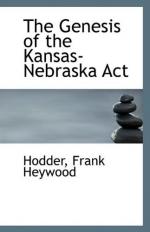|
This section contains 752 words (approx. 3 pages at 300 words per page) |

|
The Kansas Nebraska-act of 1854 both grew out of and contributed to the sectional crisis of the 1850s that ultimately led to war in 1861. This crisis pitted supporters of the extension of the slavery against those who sought slavery's restriction. Following the Compromise of 1850, which left extremists of North and South without grounds for anti- and proslavery agitation, most Americans proclaimed an end—"a finality"—to the conflict over the extension of slavery. Reality was somewhat more troubling. There was never a majority in Congress in 1850 that favored a comprehensive settlement of the slavery extension issue. Both the Whig and Democratic parties suffered from sharp internal differences over the meaning of the Compromise. By the 1852 presidential election, the two-party system was fragmented and weakened. The Democrats won a convincing victory in the electoral college, essentially ending the political viability of the Whig Party; but Franklin...
|
This section contains 752 words (approx. 3 pages at 300 words per page) |

|


